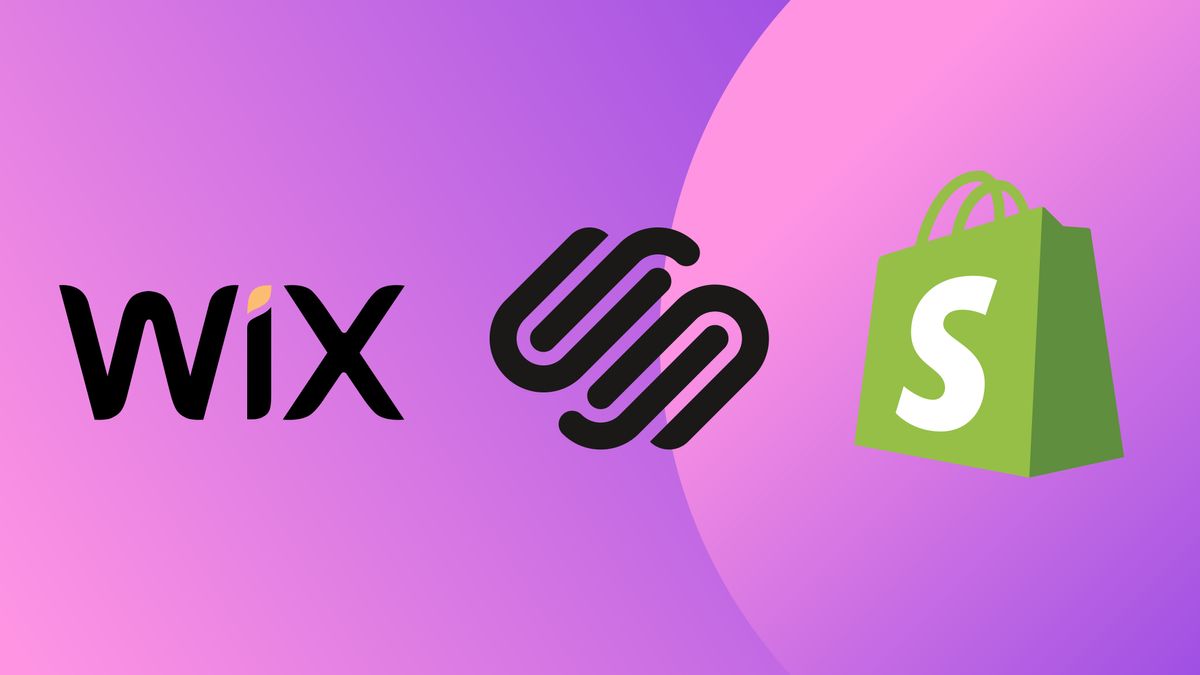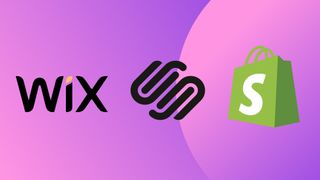
Jump to the quick list↴
1. Best overall
2. Best for creatives
3. Easiest ecommerce
4. Best quick option
5. Cheapest e-commerce
6. Best for marketing
7. Best for support
8. Best for one-pagers
9. Best for simplicity
10. Best for WordPress
How to choose
How we test
FAQs
A website should be high on the list for anyone starting a small business. In fact, it can be your number one marketing tool – a place your potential customers, suppliers, investors and partners can find out all about what your business does and buy your goods and/or services. However, setting up a website can be a tricky process – which is why we’ve put together this guide to the best website builders for small businesses.
We’ve tested all the leading online website builders, and some lesser-known ones, to help you choose the one that’s right for your venture. The key criteria here is that it should save you time and money – otherwise there’s no point. So, each item on our list is relatively inexpensive and no code is required to use any of them.
Our guide covers a range of price points and includes the best options for online shops as well as site builders best geared towards crafting a beautiful creative site. If you want a simple calling-card website, we’ll show you the best choice. Similarly, if you want to use WordPress – currently the world’s favourite web platform – we’ve got a great website builder geared to this technology.
In order to test these sites, we’ve signed up to each one exactly as though we were building a site from scratch, assessing their design, SEO and ecommerce tools; checking out their pricing plans and levels of service; as well as considering their scalability and future potential.
We’ve also tested a range of free website builders, the best website builders for photographers and the best website builder for artists.
Quick list
 Best overall
Best overall
Wix balances performance with value well, combining a super easy-to-use interface with plenty of customisation options and affordable pricing plans. The service is keenly focused on small businesses, too, meaning the Wix team have thought of everything you might need.
Read more below
 Best creative
Best creative
Squarespace offers nearly unrivalled visual appeal with its wide selection of elegantly designed templates that will truly make your creative business sing. It offers a great user experience and a great range of optional ecommerce tools, but it’s worth noting that it’s pretty pricey.
Read more below
 Best for ecommerce
Best for ecommerce
Shopify is the go-to website builder if you want to set up a shop. It’s super-easy to use, and its menus guide you through the process, helping you with everything from orders to marketing to analytics. It offers 10 free, good-looking templates with more on offer if you don’t mind paying for them.
Read more below
 Best quick option
Best quick option
While it’s a little basic, GoDaddy offers one of the most streamlined routes to getting online out there. There are plenty of great ecommerce and analytical tools, and the interface is really easy. If you don’t mind slightly basic results, this is a fine choice.
Read more below
 Cheapest ecommerce
Cheapest ecommerce
If your priority is selling without paying a lot to manage your shop, Weebly offers everything you need without the extra tools of many options on this list. It’s a little fiddly to use, and has a more limited template selection, but it’s got a great app and offers members-only pages on higher subscriptions.
Read more below
 Best marketing
Best marketing
Hostinger is a great choice for small businesses wanting to get serious about their income. It offers exceptional marketing and e-commerce integration with audience analytics, and has some useful AI tools for building your website too.
Read more below
The best website builder for small business overall


Specifications
Reasons to buy
Reasons to avoid
Wix provides excellent value for money with a great service, which is why it’s our pick as the best website builder for small businesses overall.
In our testing, we found Wix’s interface super-easy to use. You can add your own text and images to page designs via drag and drop, which pretty much anyone who’s used to working on a computer can do. When we did run into problems, there were Help buttons everywhere on the page.
It’s affordable, easy to use, and tightly focused on a small business audience. And there are more than 800 business templates to choose from, covering almost every type of enterprise you can think of, from finance and law to farming and gardening.
A ‘free forever’ option gives you up to 500MB storage and 500MB bandwidth, however Wix ads will appear on every page of your site, and your URL will be accountname.wixsite.com/siteaddress. If you just want a ‘calling card’ website with your company’s details and information, and don’t need an online store, you may be happy with all of that.
Beyond that, the paid-for plans are very reasonably priced and give you a bespoke domain, access to more storage and a marketing suite. From the Core tier up, you’ll get site analytics and the ability to accept payments. Considering its price and features, Wix is the best website builder for small businesses overall. For more info, see our Wix review and our comparison of Squarespace vs Wix.
Best for creatives

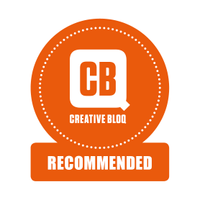
Specifications
Reasons to buy
Reasons to avoid
If you run a creative business, such as a photography studio, then the visual appeal of your website is pretty much your calling card. So you want one of the best small business website builders with attractive templates, and Squarespace has the most elegantly designed of them all.
Carefully crafted by pro designers, with clean lines and lots of white space, these layouts can really help your business website stand out from the crowd. You can also customise the templates as much as you like.
When we reviewed Squarespace, we found its drag-and-drop interface was a little fiddlier to use than Wix’s or Weebly’s. There’s no need for coding or web design skills, though, just a little time spent learning the system. And we appreciated the helpful pop-up boxes that appear wherever you point your cursor, guiding you through the different elements of the interface.
Squarespace is also more expensive than most, but if you want your business to look good online, it’s probably an extra cost worth paying. Squarespace also offers a great range of ecommerce tools if you want to set up an online store, integrate with ShipStation to print shipping labels, or set up shoppable Instagram posts. There are great analytics and email campaign tools too.
For more, see our Squarespace review and comparison of Squarespace vs Wix. Overall, we recommend Squarespace for creatives over Wix because of its templates, but Wix is the cheaper option and still has some decent templates. If you want something even cheaper, we suggest Weebly (below).
Easiest ecommerce
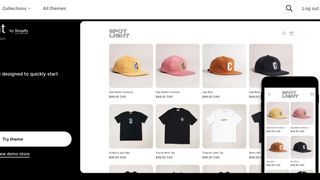
Specifications
Reasons to buy
Reasons to avoid
Shopify is ideal for anyone who wants to sell items via their website. It’s very easy to use and is ideal for beginners. When we tested it, we found it incredibly easy to set up an ecommerce site. It’s got plenty of features too, there’s order and product management, shipping and tax features built in, but there’s also marketing tools to launch social or email campaigns, for example, which should remove the need for a separate social media or email tool (although the email features are basic compared to the likes of MailChimp).
There’s also a handy analytics tab to help you keep track of how products across your catalogue are doing and an array of add-on apps that you can use to get more features – although these can be confusing, compared to the likes of Weebly. Templates are limited compared to the likes of Squarespace, there’s only 10 to choose from, but there are more options if you don’t mind paying. One con that you should consider is that unless you use Shopify payments, you’ll have to pay transaction fees for using a third-party payment gateway. Depending on how wedded you are to your payment system, this could be a deal breaker.
Overall though, as we noted in our Shopify review, if ecommerce is the aim of your website, then Shopify is a really good, easy to use option.
The best quick option
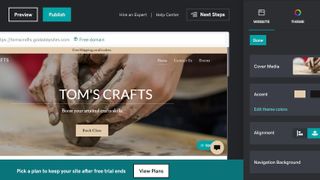
Specifications
Reasons to buy
Reasons to avoid
If speed is the priority and you want the most streamlined path to getting online, then the GoDaddy website builder is a good option. It’s quite basic, but that makes it very simple and intuitive. Plus, there’s a range of basic ecommerce tools and a full analytics portal.
When reviewing the platform, we found GoDaddy’s interface to be nice and intuitive, and we particularly liked the ability to preview different font pairings at the click of a button. On the downside, we found the templates to be quite basic. There’s not much room for customisation either, so if you want the look and feel of your site to meet certain brand or design principles, you may prefer to look elsewhere. That said, you can also switch templates at any time, which does add a level of flexibility in case you decide later that you want to redesign your site.
There’s a 30-day free trial, and pricing starts from $9.99/£6.99 per month. The Standard plan will do for many business starting out, but if you want to sell online, you’ll need an Ecommerce plan, which costs more. For more details, see our GoDaddy review.
Cheapest ecommerce
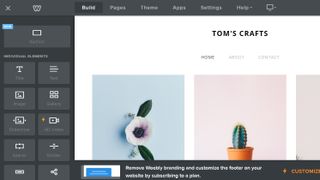

Specifications
Reasons to buy
Reasons to avoid
If you don’t just want to promote your business online, but actively sell via your website, then in our view, Weebly offers the best value. Its Pro plan offers great ecommerce tools for a low price that can’t be beaten elsewhere.
In our testing, we felt that its interface was slightly trickier to use than Shopify’s or Wix’s, although a little easier than Squarespace’s. Also, it doesn’t offer quite as many templates as Wix, and its templates aren’t as beautiful as Squarespace’s. However, we found that Weebly does win over both these rivals in other ways.
Firstly, its mobile app is particularly good, and even works when you’re offline. Secondly it allows you to create member-only pages on the Professional and Performance Plans. (That might be useful if you work with some big clients and want to provide each of them with bespoke information.)
Thirdly, there’s the Weebly App Center, which provides hundreds of apps, covering marketing, communications, ecommerce, social media and other site tools and features. Some are paid for, others are free. So while the basic interface only allows you to build a basic website, you can use these apps to tweak it to something more specialised to your business, although it can be confusing to navigate all these different apps. Finally, Weebly offers free stock images to use on your website.
You also get a shopping cart and the ability to accept payments through Square and other providers. There’s advanced site statistics reporting. And, for US customers, phone support and live chat as well as email support. In short, if you want to sell things on your site, but can’t afford to use Shopify, we reckon Weebly is your best bet. For more details, see our Weebly review.
Best for marketing
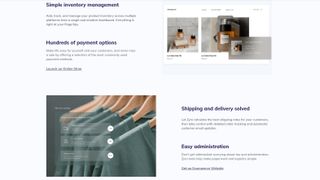
06. Hostinger
Specifications
Reasons to buy
Reasons to avoid
Hostinger comes equipped with everything you need to build and host your professional business website. This platform has come a long way, and immensely improved its services since we first reviewed it back in 2020. We found that Hostinger’s prices at the time of our review made it one of the most desirable web hosting services for creatives, although tight limitations on bandwidth and storage were a bit too restrictive for our liking.
Thankfully, Hostinger now offers the complete package for your website, including marketing integration, AI tools for business, visitor analytics, essential ecommerce tools, free SSL security, an intuitive user interface, access to a royalty-free image library, and support for multiple languages to name just a few features.
You can get started with Hostinger for as low as £1.49/mo for a basic and user-friendly drag-and-drop builder, with free SSL, or for a higher budget of £2.59 per month, you benefit from free business email and 12-month domain too.
It allows you to go beyond a simple portfolio website, with integrated marketing and ecommerce functionality to sell your products and manage orders, with analytics integrated with social media to learn more about your customer base. There are options to have your website up and running in just a few clicks, and tools provided to help you do this efficiently.
See our full Hostinger review (2020)
Best for support
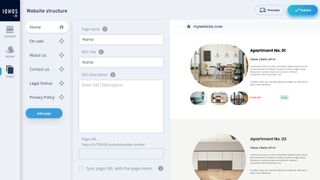
07. IONOS MyWebsite Now
Our expert review:
Specifications
Reasons to buy
Reasons to avoid
IONOS, formerly 1&1, is a veteran in web hosting (see our 1&1 IONOS review) with a strong focus on servicing small businesses across the world. And its web builder service, MyWebsite Now, is equally solid and dependable.
All packages include a free domain, email server, analytics, SEO tools and the IONOS AI Website Builder. In our experience, we’ve found the interface very user-friendly, with lots of options cleverly hidden in popup boxes to save clutter. You can choose from more than 400 templates, which can be searched by topic or keyword. You can also add an integrated online store with all major payment and shipping options included.
Overall, this is a very small business-friendly service. It’s hard to beat for price as well, with monthly plans starting at just £1. You also get 24/7 phone and email support, which reviewers on Trust Pilot say offers a fast response (although note there’s no live chat option – not necessarily a bad thing in our experience!). There’s no free trial, but there is a 30-day money-back guarantee.
Best for one-pagers

08. Strikingly
Our expert review:
Specifications
Reasons to buy
Reasons to avoid
Strikingly is an interesting option if you’re looking to create a one-page website, which isn’t a bad idea if you’re just launching a small creative business. It offers a very intuitive beginner-friendly editor and site creation tools specifically with landing pages and one-pagers in mind.
There are simple online store and blog modules that you can add for ecommerce and blogging functionality. You’re limited to a choice of only 29 templates, but at least that keeps things nice and simple.
There’s a free plan if you want to start with a strikingly.com domain, but paid plans start at very competitive prices. You can only sell up to five products with the basic Limited plan, though. That limit increases with the Pro and VIP plans, which also add more features and reduce transaction fees – to zero in the case of the VIP plan.
Best for simplicity

Specifications
Reasons to buy
Reasons to avoid
Maybe you’re not bothered about ecommerce, and don’t really care about your website looking beautiful? If you just want to build a basic site, quickly and cheaply then we recommend Gator.
Hostgator doesn’t just provide some of the best web hosting; it also has its own drag-and-drop website builder in the form of Gator. In our review, we found it to be a solid, if basic service that provides all of the standard things a small business needs, including support for password-protected pages and the ability to add an online store.
That said, we were a little frustrated that we couldn’t do much to customise our online store. We also discovered that the SEO tools aren’t great, the templates were a bit samey, there were no email marketing tools, and you can’t schedule blog posts or let visitors comment on them.
If none of that bothers you, though, it’s a good choice. Especially as there’s good 24/7 live chat, phone and email support to help you out if you need it. For more information, see our Gator review.
Best for WordPress
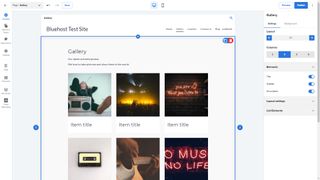
Specifications
Reasons to buy
Reasons to avoid
The website builder services we’ve listed so far are easy to use, but aren’t hugely customisable. If you’re looking for a more bespoke online presentation of your creative business, you might want to consider the web builder from Bluehost, one of our favourite web hosting services. There’s no free version or free trial, but the prices overall are quite competitive.
Bluehost runs on top of WordPress, which gives you countless options to add some finesse to your site using any of the thousands of WordPress plugins available. The Bluehost Wondersuite integrates AI to help you build a site even faster, and is included in every plan. When we reviewed it, we found it easy to use; certainly a lot easier than building a WordPress site from scratch. And we appreciated the availability of 24/7 customer support, along with some excellent email marketing and analytics tools.
The one black mark against it was page load speed. In our tests, a page we created in Bluehost took an average 2.63 seconds to load, while a basic WordPress website built on DreamHost took just 139ms. That could be improved by taking advantage of options for setting up content delivery networks and other optimisations, but it’s a bit of a faff.
Overall, though, Bluehost Website Builder is a great website builder for building a site based on WordPress. For more info, see our Bluehost web builder review.
How to choose website builders for small business
With so many website builders out there, choosing the right one can feel like wandering through a tech maze. Start by asking yourself some key questions. What’s your website’s main purpose? Showcasing your portfolio? Selling products? Booking appointments? Once you know what you’re aiming for, the way ahead will seem much clearer.
More importantly, consider how important a website is to your business overall. If it’s mainly a calling-card website you’re looking for, so people can find you online and contact you, then you won’t need anything particularly sophisticated – you can just choose the simplest options.
You’ll also want to think about whether you need more sophisticated features, such as contact forms, email marketing integration, SEO tools, or an online store. We’ve detailed when these features are available in our guide/our reviews. Remember, though, more features don’t always equal better; choose ones that directly address your small business needs. If you want to be discovered on Google, for example, then SEO tools will be for you, and if you want to sell via your website, you’ll need a website builder that has an inbuilt online shop.
Finally, many website builders offer free trials or demo versions, or sometimes money-back guarantees. So don’t be afraid to take them for a spin! Get your hands dirty with the interface, test the features, and see if it feels intuitive and user-friendly. This hands-on experience will help you identify the platform that clicks with you and your small business.
How we test website builders for small business
To test the easiest and best website builders for small business owners, we sign up as any small business owner would, feeling out the onboarding process and pricing plans, and seeing whether they are transparent and affordable.
We then assess how easy these services make it to build a website. Do the templates look good, and are they customisable? We go through the process of building a website from start to finish, paying attention to the drag-and-drop editor’s flexibility, ease of use, and the mobile responsiveness of the site when finished.
We also test essential features like blogging, contact forms, SEO tools, and ecommerce functionality and decide whether they are intuitive and powerful enough for most business owners. Friendly and efficient support is also crucial so we test the knowledge base resources, and live chat/phone options. We ask for help, and see how quickly we get it and whether it solves our problem. Finally, beyond the platform itself, we assess marketing tools, integrations with third-party services, and overall scalability for future growth.
FAQs
Does my business need a website?
These days, almost every business needs a digital presence, including physical businesses, as more and more people are shopping and researching their purchases online. If you don’t have an online presence, you’re losing out on opportunities for potential customers to find your products or services.
Many small creative businesses go for the quick and easy route of using social media (see our guide to how to sell on Instagram). This is better than nothing, but it does mean you’re potentially missing out on huge numbers of potential customers and you limit your ability to be able to actually sell online and process payments. Even if you’re using Instagram, to get its full potential, you’ll want a website so you can easily add products to your Instagram shop.
With a website, you can use social media platforms such as Instagram, X, Facebook and LinkedIn to make announcements about your business, and send users to the site to where they can find out more about you, make purchases or get in touch directly.
If you have your own website, you can control everything much more precisely, appear in Google search results, conduct ad campaigns and give customers a unique URL, which makes it easy for them to locate you online. Added to that, it just looks a lot more professional and will help customers trust you with their money.
Do I need to learn how to code?
With the website builders described in our guide, no coding skills are required. Each has been designed for ease-of-use and, although you’ll make creative and functionality decisions during the process, the technical side is all taken care of for you. While most large businesses have teams of coders to ensure their highly complex sites run smoothly, website builders help small business owners to be agile and to control costs. With a website builder you can create something that is clear and effective, without spending time or money learning to code. As your business grows, you may require a bigger, more complex, more bespoke site to meet its needs, but you can cross that bridge when you get to it.
Do I need to hire a web designer?
There was a time when, to create a website for any business, you either needed to learn code (see above) or hire a web designer. The former would take a long time and the latter would cost a serious amount of money. Thankfully, these days, there’s a third option: using a web builder, which is what we deal with in this guide.
Web builder platforms only cost a few dollars or pounds a month, but provide a simple interface that makes it very easy to build and maintain your own website. You just have to choose a template, then drag and drop in your own images, text and video. Typically, you’ll also get a domain name and hosting for your website included in the price.
If you don’t want to deal with your website at all, then you may need to hire a web designer to help. Or, you may want to hire a web designer to get you set up, and then teach you how to manage the site yourself. It really depends how hands-on you want to get, as well as what your budget is.
What should a small business website include?
Every business is different, and so what a small business website should include will vary from company to company. Generally, though, there should always be a homepage that that introduces your business and its main offers. Visitors will also expect an About page that discusses who you are, what you do and why. You will always need a Contact page outlining all the ways people can get in touch, including an address, phone number and email, as well as links to any relevant social accounts.
Other pages you may want to include are pages listing your products and/or services; an online shop; FAQs (frequently asked questions); a place for case studies, testimonials and/or reviews; a news page or blog for announcements; and perhaps a page linking through to press stories about your company. It’s important when planning your site that you also plan how you will keep its content up to date.
Don’t plan for pages that require a lot of updating if you won’t have time to do it. A site with lots of out-of-date sections can have a negative impact on how your business is perceived.
Do I need to learn about search engine optimisation (SEO)?
Another great thing about online website builder platforms is that many of them give you the tools you need to manage search engine optimisation without having to learn the topic in any depth.
Google Analytics is the most widely-used service for search engine optimisation, however with website builders such as Weebly, Wix or Strikingly, traffic can be monitored using their internal tools. To use Shopify, you will need to set up a Google Analytics 4 account to measure the performance of your site and your ads, but this is fairly simple to set up.
In most cases, you can use Google Analytics with a website created using a site building platform. This can enhance or run alongside the platforms existing SEO tools, and can be set up using a plugin on the platform.
For many small businesses, understanding site traffic and SEO, even at a basic level, can be useful for improving performance. More traffic can lead to more leads can lead to more customers.
What’s the best website builder for small business?
Overall, we’ve picked Wix as the best website builder for small business because it’s affordable, easy to use, and clearly focused on small business use. Its web building interface is very easy and intuitive for non-techies. There are more than 500 business templates to choose from, covering almost every type of enterprise you can think of, from finance and law to farming and gardening. That said, if you want an online store as part of your website, you may be better off with Weebly, as its pricing is more competitive in this area.
